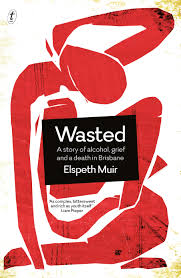
Wasted
A story of alcohol, grief and a death in Brisbane
4 March 2017
The following piece discusses death, dying and grief.
There were flies in the kitchen, cane toads in the driveway, golden orb spiders in the Camellia and mosquitoes in the window blinds. Currawongs, butcher birds and magpies sang and shat in the frangipani tree while lizards hunted on the pool tiles. At night possums crawled along the brush fence and bats fought over greenish bananas — everything but my brother was alive.
— Elspeth Muir Wasted
Published by Text
In 2009 Elspeth Muir’s youngest brother Alexander finished his last university exam and went out with some mates. Later that night he drifted alone to the Story Bridge, put his things on the walkway and jumped 30 metres into the Brisbane River. Wasted is an intense memoir that weaves biography and reportage into a narrative that’s confronting, honest, generous and warm.
Wasted exposes how the marriage between Australia’s larrikin stereotype and ‘drinking as pastime’ (rather than accompaniment to other activities) creates a culture that normalises excessive drinking. This runs especially deep for those of us who can see ourselves in Elspeth’s descriptions of drunken days and nights. The familiarity of such stories — not benign, prosaic or mundane — explain how Alexander’s drunken escapades were viewed by friends and family as mischievous behaviour from a good-hearted bloke up for a laugh. The problem with a society normalising such drinking is that we struggle to identify problems until a tragedy happens — which, as we all know, is too late.
In 2015 it’s estimated 5,785 Australians aged 15 and over died from alcohol-attributable causes. Cancer was responsible for 2,106 (36%), with injuries, cardiovascular diseases and digestive diseases the next leading causes (about 1000 deaths each: 17%). Further, breast cancer and liver disease were the biggest killers among women. Among men, liver disease and bowel cancer were the most common killers. Hospitalisations averaged about 400 a day, with alcohol dependence (21%), falls (12%) and alcohol abuse (10%) the main causes.1
In light of these numbers, overall rates of alcohol-induced deaths have declined compared with 20 years ago; such deaths declined significantly in the 2000s after peaking in the late 1990s (stabilising between 2013-2017); and alcohol consumption has decreased over time: the current rate of 9.4 litres per capita compared with 13.4 litres in 1974-1975.2 While this indicates Australians are drinking less than in the past, culturally there’s still an issue. Every week one person between 16 and 25 dies in an alcohol-related incident. One in five Australian drinkers drink 75% of all alcohol consumed in Australia. Twenty percent of us drink eighty percent of the alcohol consumed.2 Wasted joins the dots between a bottle of wine with dinner and getting so drunk that blacking out and memory loss is commonplace, and through personal confession Elspeth depicts an Australian culture addicted to alcohol in more ways than we’d wish to admit. In 2017 the alcohol-induced death rate (1,366 deaths) was the highest since 1997 (1,156 deaths).2
For Elspeth to write so honestly about the grief and trauma of losing her brother is, of course, fearless — as is confronting Australia’s drinking problem head on. Reflecting on the loss of her brother, she exhibits candour without self-pity: ‘I wasn’t sure if I was crying because I had to or because I was acting, trying to emulate normal sadness.’ Like all of us, Elspeth has multiple inconsistent desires; and even while conflicted, her wishes are relatable — none more so than her need to give Alexander’s death meaning.
Wasted is, at times, sublime — I hear, smell, taste and feel Brisbane in Wasted’s opening paragraph; yet at other times is so very difficult to read — the recounted drunken stories are so familiar that I’m there. Alexander didn’t want to die, and he didn’t need to. ‘His death was a waste,’ Elspeth writes. Wasted is a clear and obvious portrait of a sister’s grief that brings to light the darkness that happens when we drink. I’d like to thank Elspeth for sharing her brother’s story with us.
Links and references
If you feel like you need speak with someone at any time about anything:
- Family Drug Helpline: 1300 368-186. Operates a free confidential support line 24/7.
- Youth Substance Abuse Services: 1800 014-446. Youth support advocacy service that provides free and confidential support.
- Counselling Online: 1800 888-236. Operates free drug and alcohol counselling 24/7.
- Kids Helpline: 1800 55 1800. Operates any time, any reason.
- Parentline: 1300 301-300. Operates 8am-10pm, seven days, QLD and NT.
- Lifeline: 13 11 14. Operates a free confidential 24-hour support line and a nightly online crisis support chat.
- Griefline: 1300 845-745. Operates a free confidential phone service from 12pm to 3am, seven days (National – Landline Only), and an online counselling service.
- The Suicide Call Back Service: 1300 659-467. Operates phone, video and online counselling 24/7.
- DrugInfo: 1300 85 85 84. Information line.
References
- Curtin University’s National Drug Research Institute
- From the ‘Deaths dues to harmful alcohol consumption in Australia’ (Australian Bureau of Statistics) and ‘Apparent Consumption of Alcohol Australia report (2016-2017)’.
- In the past 40 years (1979 to 2019) Australia’s population almost doubled (14.51mil to 25.26)
- Alcohol-induced deaths declined during the 2000s, after peaking in the late 1990s — reaching a low of 4.5 deaths per 100,000 people in 2012 (4.5/100,000).
- Alcohol consumption has decreased since 1974/75. Current rates are 9.4 litres per capita compared with 13.4 litres (1975).
- Alcohol-induced deaths stabilised between 2013-2017.
- Overall alcohol-induced deaths have declined when compared with 20 years ago.
- However, an alcohol-induced death rate of 5.1/100,000 was recorded in 2017 (1,366 deaths), which was the highest since the peak in 1997 (1,156 deaths).
- This change is specifically marked for women, who have recorded their highest rate of alcohol-related death at 7/100,000.